Today at Dell Technologies World, Dell EMC launched several new products and updates for their storage and data protection families. On the storage side of the house, Dell EMC has launched their next generation midrange platform, Unity XT, which is headlined by improved data reduction capabilities, a big performance boost as well as being NVMe ready. Dell EMC Isilon gets an operating system update with OneFS 8.2, and a new hybrid node, the Isilon H5600. Dell EMC Cloud Storage Services provide unique access from Dell EMC storage solutions to the cloud. PowerMax arrays now support Intel Optane dual-ported NVMe SSDs. Turning to backup and recovery, Dell EMC is launching a new backup appliance dubbed PowerProtect X400, which comes with a new PowerProtect Software Platform. The IDPA DP4400 (IDPA DP4400 Review) is also now available in a smaller capacity offering.
Dell EMC Unity XT
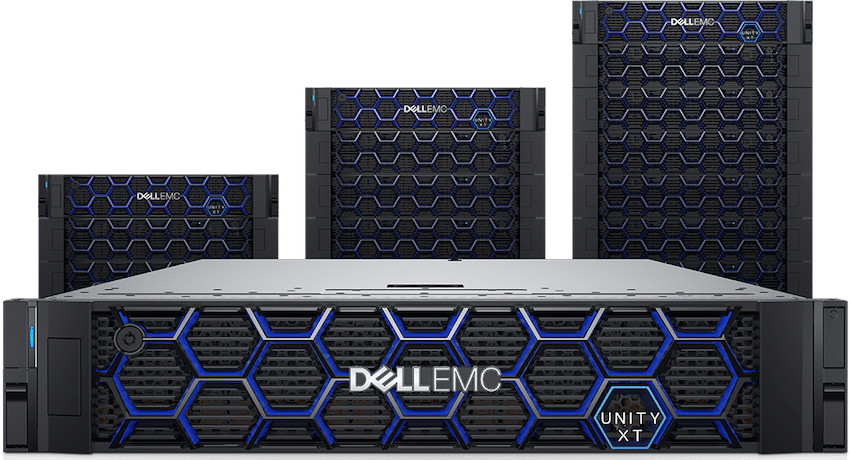
Dell EMC Unity has been a popular option in the midrange due to its blend of performance and ease of use. When we reviewed the Unity 450F last year, we were so impressed with the system’s VMware integration and performance profile, the system earned an Editor’s Choice award. Dell EMC has raised the bar with the next generation Unity XT, promising a 2X performance increase over its predecessor. This is thanks in large part to software optimizations and newer Intel Skylake CPUs. Unity XT is also “NVMe ready,” which means the platform will support this faster interface (compared to SAS) to unlock even more performance. Unity XT comes on PowerEdge servers that have support for NVMe SSDs in 8 specific bays. Dell EMC will release a Unity OS update within a year of shipping to enable NVMe within Unity to allow XT systems access to these bays. Until then those bays support traditional SAS SSDs.
Data reduction has been improved in the Unity platform as well. Last year Dell EMC added deduplication to the Unity OS, at launch only compression was available. For the Unity XT, this means up to 5:1 data reduction and 85% system efficiency. Because Unity can be run virtually, it’s well-equipped to be run in the cloud. Unity XT is no different in that regard, it can run in a public cloud giving customers a seamless way to move data to and from the cloud.
Like the previous models, Unity XT is available in hybrid and all flash configurations. Unity XT comes in a 2U enclosure with support for up to 25 drives. Expansion is available in 2U (25 drives) and 3U chassis. The hybrid configurations also support a 3U 15 3.5″ drive chassis. At launch Unity XT supports SAS SSDs in 800GB, 1.92GB, 3.84GB, 7.68GB and 15.36GB.
Unity XT Key Specifications:
| Unity XT 380F/380 | Unity XT 480F/480 | Unity XT 680F/680 | Unity XT 880F/880 | |
|---|---|---|---|---|
| Min/Max Drives | 6/500 | 6/750 | 6/1000 | 6/1500 |
| Intel CPUs | 12 cores per Array, 1.7GHz | 32 cores per Array, 1.8GHz | 48 cores per Array, 2.1GHz | 64 cores per Array, 2.1GHz |
| Array DRAM | 128GB | 192GB | 384GB | 768GB |
| Max Raw Capacity | 2.4PB | 4PB | 8PB | 16PB |
Dell EMC Unity is expected to ship in the second quarter of this year.
Dell EMC Isilon OneFS 8.2, Isilon H5600
Dell EMC Isilon F810
Dell EMC is continuing to add to the capabilities of the Isilon scale-out NAS family to deal with ever increasing amounts of data. Isilon OneFS 8.2 provides several new enhancements including a massive boost to scalability, a jump of 75% to 58PB within a single file system and support for clusters as large as 252 nodes, up from 144 previously. OneFS also puts further focus on being multi-cloud friendly as Dell EMC rolls out support for the Google public cloud and Alibaba.
In addition to the OS update, Dell EMC is rolling out a new system, the Isilon H5600. Launched just a few weeks after Dell EMC announced a new all-flash Isilon system, The H5600 is a hybrid Isilon node designed to blend performance and capacity without the cost of going all flash. The H5600 uses a dense 4U chassis to deliver capacity up to 800TB per system. Additionally the H5600 is quoted of being able to deliver 8GB/s bandwidth.
Isilon H5600 Key Specifications
| Chassis Capacity | 800TB |
| HDDs per Chassis (3.5″ 4KN SATA) | 80 (10TB) |
| SED Option | Yes |
| Operating System | Isilon OneFS 8.2 or later |
| Nodes Per Chassis | 4 |
| CPU Type | Intel Xeon Processor E5-2680 v4 |
| Memory per Node | 256GB |
| Cache per Node 1.6TB or 3.2TB SSD | 1 or 2 (SED Optional) |
| Front end Networking per Node | 2 x 10GE (SFP+) or 2 x 40GbE (QSFP+) |
| BAck end Networking per Node | 2 x 40GbE (QSFP+) |
| Typical Power Consumption @ 240V per Chassis | 1120 Watts (@25C) |
The OneFS 8.2 update and H5600 hybrid node are expected to be released in the second quarter of this year.
Intel Optane SSD DC D4800X Dual Port Launches On Dell EMC
Intel and Dell jointly announced support for the Intel Optane SSD DC D4800X with dual port NVMe interface for PowerMax systems. First announced earlier this month at Intel’s CPU update, the D4800X offers dual ports to allow data access in the event of a single failure or during a controller upgrade. The drive will be offered in capacities up to 1.5TB.
While this marks yet another expansion of the Optane family; it is the result of a three-year collaboration between Dell and Intel. The drive is designed for both performance and high-availability particularly in enterprise storage environments that need constant data access, such as reservation and banking systems. Within the Dell EMC PowerMax, the Optane SSDs work within the automatic data placement scheme to deliver the best performance possible without creating silos.
PowerMax systems with the dual port Intel Optane SSD DC D4800X are available now, with support for 375GB, 750GB and 1.5TB capacities.
Dell EMC Cloud Storage Services
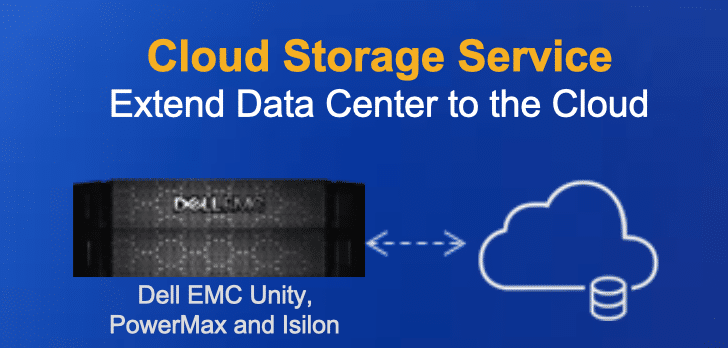
The goal of Dell EMC Cloud Storage Services is to extend customer’s data centers to the cloud by using a high-speed, low-latency connection from public clouds directly to Dell EMC Unity, PowerMax and Isilon storage systems. Dell EMC has identified two initial use cases for this service. The first is an automated disaster recovery as a service (DRaaS) offering for VMware that’s supported on Unity and PowerMax systems. The second use case enables cloud compute burst for activities like test/dev, analytics and workload migration where customers need more compute, but only for a short period of time.
The Dell EMC Cloud Storage Services are available now in North America and London and will be expanded globally over time.
Dell EMC PowerProtect Software Platform
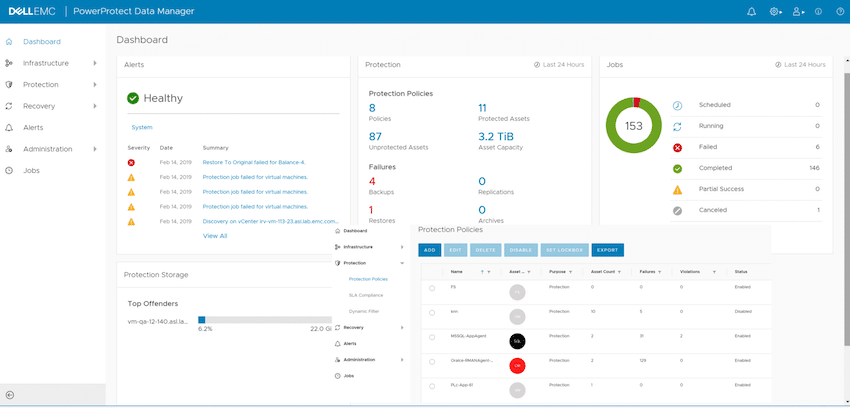
The PowerProtect Software platform is Dell EMC’s next generation data management platform. The platform delivers data protection, replication and reuse, as well as SaaS-based management, self-service capabilities and multi-cloud support. All of this is designed to give data owners the autonomy to control backup and recovery operations. As is typical, Dell EMC has a strong VMware integration here as well, VMware customers get automated policy-based protection and integration with vRealize Automation.
PowerProtect Software is going to be available in the second quarter of this year.
Dell EMC PowerProtect X400
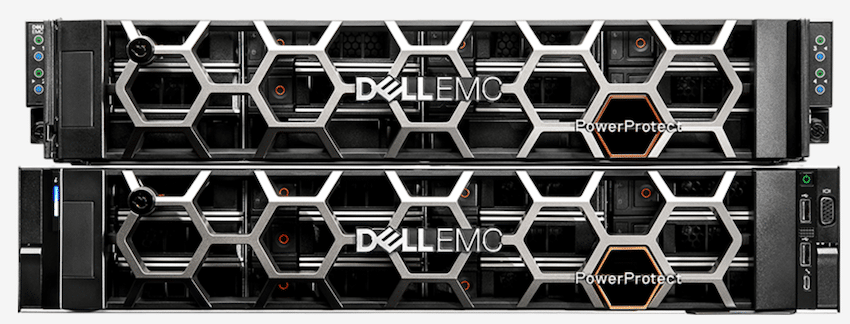
The Dell EMC PowerProtect X400 is the latest appliance targeted at simplifying backup and recover. Available in hybrid or all-flash configurations, the X400 leverages Dell EMC PowerEdge server technology combined with the PowerProtect software platform to deliver a converged backup appliance. From a scalability perspective, the X400 can scale-up with grow-in-place capacity expansion and scale-out by adding compute power and capacity. Lastly, while deduplication is typical in backup appliances, Dell EMC stresses they’ve added a machine learning element here to enable a more optimized dedupe capability.
The X400 is available in the second quarter of this year.
Dell EMC Integrated Data Protection Appliance (IDPA) DP4400

The Dell EMC Integrated Data Protection Appliance DP4400 is a 2U converged appliance that brings together an entire suite of Dell EMC data protection tools. For smaller operations, Dell EMC is announcing the availability of an 8-24TB version of the DP4400. The lower capacity is targeted for SMBs, ROBO use cases and others where the need for enterprise-grade backup exists, but the data footprint is smaller. Of course if data demands grow, the DP4400 can scale to 96TB with the purchase of license keys and an upgrade kit.
The DP4400 is shipping now, with the smaller capacity units available in the second quarter.


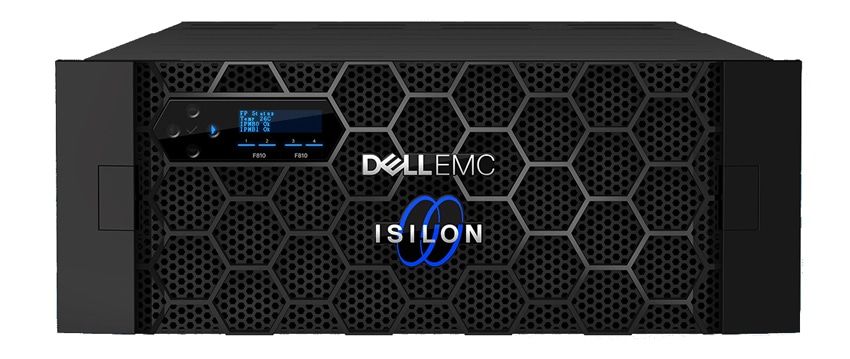


 Amazon
Amazon